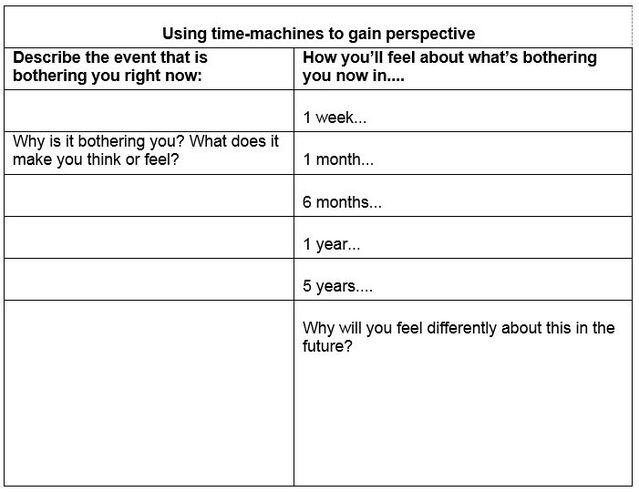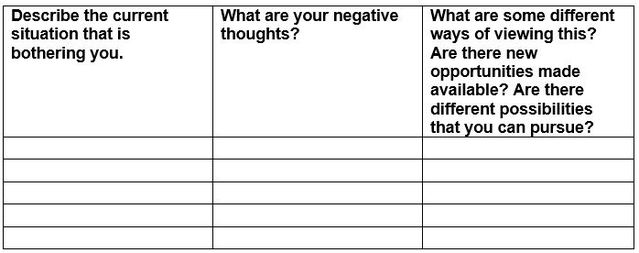Friends
Are You Blowing Things Up in Your Head?
Four techniques to gain perspective.
Posted August 1, 2018

If you are someone prone to anxiety, depression or anger then it is likely that everyday occurrences can seem like catastrophes. Someone says something you don’t like and it seems awful. You can’t stand it. You are driving in traffic and it is all backed up and you are leaning on the horn because—you can’t stand being stuck in traffic. Someone treats you unfairly and you tell all your friends what a horrible person she is—and you can’t stand that either. You lose money, a relationship isn’t going the way you want, your boss is irritated, or you are just not getting what you want. I know what it feels like because I have had all these thoughts in my life and it drove me up the wall. But, I survived.
We tend to get ourselves really upset, angry and agitated when we look at something we don’t like and treat it as if it were awful. I don’t want to invalidate that bad things happen or that things can be unfair. But life often involves disappointment, unfairness and frustration, so it might be helpful to use some techniques to soften the blow, ease the landing, and give you a perspective on things.
Let’s look at four techniques that can help you put things in perspective:
1. See Things on a Continuum
When we are anxious or agitated we often see things as either all good or all bad. Seldom do they seem all good. We take a frustration—let’s say an argument with your partner—and turn it into a catastrophe. Of course it feels like a catastrophe, but maybe it isn’t. The continuum technique allows you to rate this event in comparison with other possible negative events. Look at the figure below and ask yourself where you would rate this event—compared to the Holocaust, losing all your money, a terrible disease, being late to a meeting, and tight shoes.
Maybe the discomfort of tight shoes gets a rating of 10. A terrible disease might be 90. This event? Hmmm. Could be 20? Or does it feel like 95%?

2. Get into a Time Machine
What is bothering you right now may seem like life is overwhelming and that your misery will last indefinitely—maybe, forever. But will it? Let’s take the argument with your partner. You are really upset right now, but how might you feel in a day, a week, a month, a year? Look at the table below and see if you can answer the questions:


3. Look at it From a Different Point of View
Right now when you are upset you are looking at things from one of the worst perspectives-that it is a disaster, you can’t stand it, and it’s going to continue forever. When we are upset we often focus on one point of view—our own—not realizing that there are many different ways of viewing things. Consider the current situation and your point of view. Describe the situation in the left column and your negative thoughts—your “interpretations”—in the second column. Now, in the third column, list different ways of seeing the current situation—different interpretations, behaviors that you might pursue, opportunities, etc. For example, you just had an argument with your partner. You are now plagued with thoughts that she doesn’t love you, that the world will fall apart when she leaves you and that no one has arguments like this. But maybe there are other ways of viewing this. Maybe all couples argue about something. Maybe almost everyone says things that are unfair at times. Maybe the mood will change in the next few hours. Maybe the two of you can come up with new solutions to problems that you argued about. Maybe this is an opportunity to grow by developing better rules for discussing differences. Take a look at the table below and see if you can identify your negative thoughts and then see if there are different ways of looking at things.

4. What You Can Still Do
Sometimes really unpleasant things happen in our lives—people leave us, we lose our jobs, we may even fail at school. These are real, negative, and unpleasant experiences for just about everyone. But we may be more resilient than we think we are. Maybe it will take some time, but we can bounce back if we look for alternatives. So, let’s say that you do have an argument and then you break up. Your heart may be broken, but take a look at this dialogue I had with a patient:
THERAPIST: I can see that you are upset over the breakup with Jenny and it seems to you that there isn’t much that can give meaning or pleasure in your life. This must be hard for you.
PATIENT: Yeah, it’s like, there’s nothing in my life right now but emptiness.
THERAPIST: That’s a hard way to feel. Just empty, nothing. I wonder if we can take a look at this for a moment and see what else there is. Let’s think this through. Given that Jenny is no longer available, what are some things that you can still do? Let’s start with work and friends.
PATIENT: OK. Well I can still go to work. I do. I only missed a day of work—right after the breakup. But yes, I can still work. And I do get my mind off of things at work.
THERAPIST: How about friends?
PATIENT: Yeah. I still see my friends. Not as much as I used to.
THERAPIST: OK Let’s write down the names of some friends in your life—people you have seen in the past few months and people you haven’t seen for a while.
PATIENT: (writing names) There’s Phil, my best friend, I saw him the other night for dinner. And then there’s Jim, Wendy, Xavier, Marianne. And, yeah, I haven’t seen Alan for a while—he lives in Boston—but he’s a friend.
THERAPIST: OK, so there are friends near and far. Those are still some things to do. And how about other activities like working out, movies, sports, other interests?
PATIENT: Yeah, I should get back to working out. And I wanted to go down to the Film Forum and see this new French movie. There are a lot of things I can do.
THERAPIST: So, even though the loss is very difficult—not having her in your life—not having Jenny—there are a lot of things that you can still do.
PATIENT: That’s true. I guess I was just focusing on one thing—the loss.
Concluding Thoughts
Life is not always easy—often it is hard, often incredibly hard. Many people have had flashing thoughts of hopelessness—sometimes these thoughts and feelings last a long time. But whatever you struggle with, consider the possibility of how you might eventually put things in perspective. Stand back, imagine looking at from a different angle, and experiment with some of these techniques. Maybe you have your own techniques that have helped. Use them.


